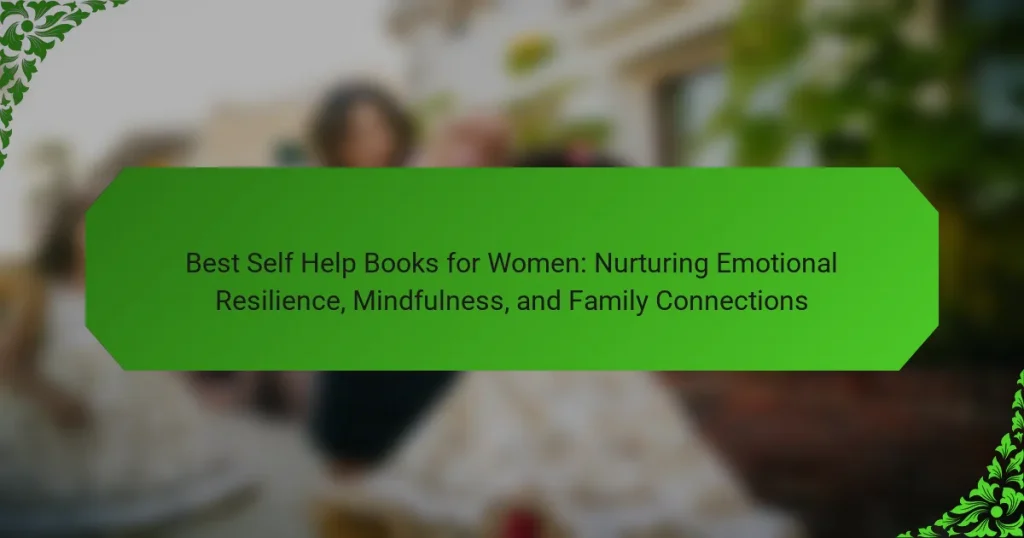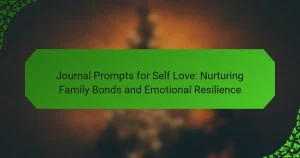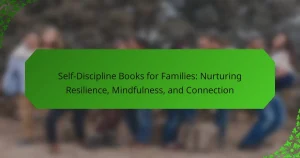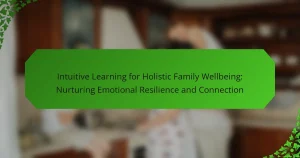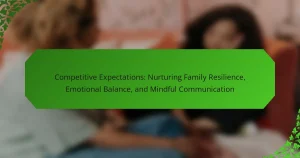Women often seek guidance to build emotional resilience, practice mindfulness, and strengthen family connections. This article highlights impactful self-help books that empower women, featuring insights from notable authors like Brené Brown and Glennon Doyle. It also explores lesser-known voices that offer unique perspectives on personal growth. Readers will discover actionable strategies to integrate these lessons into their daily lives for enhanced well-being.
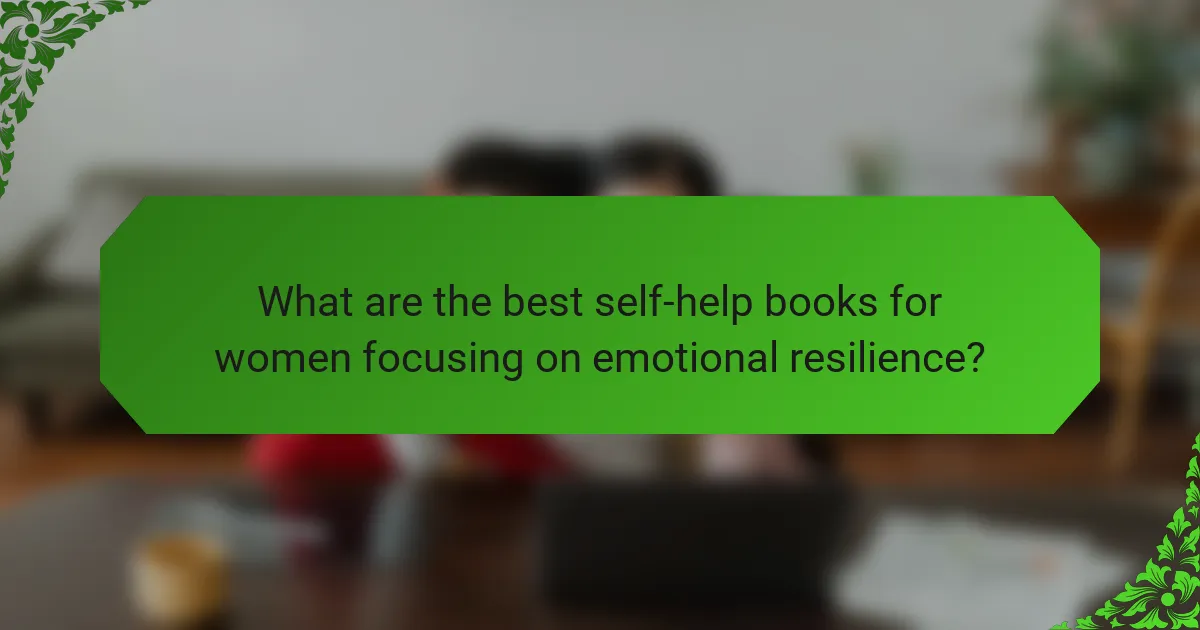
What are the best self-help books for women focusing on emotional resilience?
“The best self-help books for women focusing on emotional resilience include titles that empower and inspire. Notable selections are ‘The Gifts of Imperfection’ by Brené Brown, which fosters self-acceptance, and ‘Rising Strong’, also by Brown, emphasizing resilience through vulnerability. ‘Untamed’ by Glennon Doyle encourages women to embrace their true selves, while ‘The Power of Now’ by Eckhart Tolle offers mindfulness techniques for emotional balance. Lastly, ‘You Are a Badass’ by Jen Sincero provides motivational insights for personal growth.”
How do these books foster emotional resilience in family dynamics?
Self-help books for women enhance emotional resilience in family dynamics by providing practical strategies and insights. They encourage mindfulness, fostering better communication and understanding among family members. These books often include relatable stories that illustrate overcoming challenges, which can inspire women to apply similar techniques in their lives. Furthermore, they emphasize the importance of self-care and emotional awareness, helping women navigate family relationships more effectively.
What are the key themes explored in these self-help books?
The key themes explored in self-help books for women include emotional resilience, mindfulness, and family connections. These books address the unique challenges women face, offering strategies to build inner strength, practice self-awareness, and enhance relationships. Emotional resilience is often emphasized through techniques that promote self-acceptance and coping mechanisms. Mindfulness practices are commonly integrated to foster present-moment awareness and reduce stress. Family connections are explored to strengthen bonds, improve communication, and create supportive environments. Together, these themes empower women to navigate their personal and professional lives effectively.
How do authors address challenges faced by women in family settings?
Authors address challenges faced by women in family settings by providing practical strategies and emotional support. They emphasize emotional resilience, mindfulness, and the importance of family connections through relatable narratives and actionable advice. For example, books often include personal stories that resonate with women’s experiences, fostering a sense of community and understanding. These resources empower women to navigate familial challenges, enhancing their well-being and relationships.
What role does personal storytelling play in these narratives?
Personal storytelling enhances narratives in self-help books for women by fostering emotional connection and relatability. It allows readers to see themselves in the experiences shared, promoting resilience and mindfulness. Unique attributes of storytelling include authenticity and vulnerability, which encourage personal reflection and growth. As a result, narratives become powerful tools for building family connections and supporting emotional well-being.
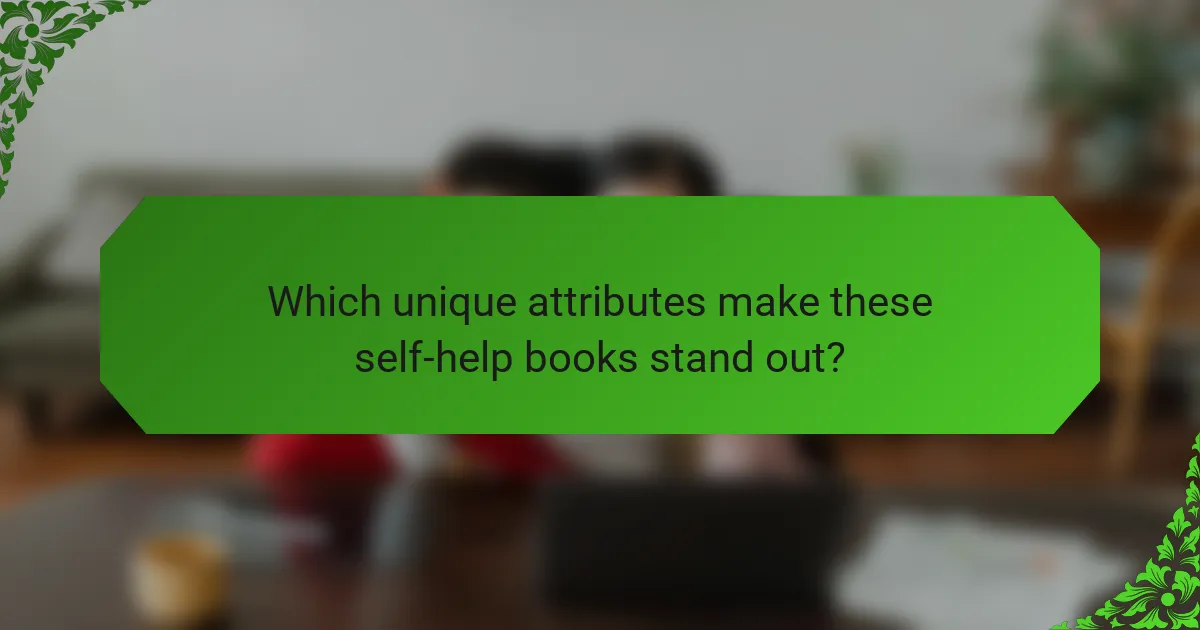
Which unique attributes make these self-help books stand out?
Unique attributes of self-help books for women include a focus on emotional resilience, practical mindfulness techniques, and fostering family connections. These elements empower women to navigate challenges effectively. Additionally, many books incorporate personal stories that resonate deeply, enhancing relatability and engagement. The integration of evidence-based strategies further distinguishes these titles, offering readers actionable insights for personal growth.
What specific techniques do authors recommend for enhancing mindfulness?
Authors recommend several techniques for enhancing mindfulness, including meditation, deep breathing exercises, and journaling. Meditation helps cultivate awareness and focus, while deep breathing techniques reduce stress and promote relaxation. Journaling encourages reflection and emotional processing, fostering a deeper connection to one’s thoughts and feelings. These practices are essential for nurturing emotional resilience and family connections.
How do these books integrate family connections into their teachings?
These books emphasize family connections by providing strategies for strengthening relationships and enhancing emotional resilience. They often include exercises that encourage open communication and shared experiences among family members. For example, some books offer guided reflections that help readers identify family dynamics and promote mindfulness in interactions. This integration fosters a supportive environment that nurtures emotional well-being. Additionally, they highlight the importance of family as a source of strength and resilience, reinforcing the idea that emotional health is interconnected with family ties.
What practices are suggested for nurturing relationships?
To nurture relationships, focus on open communication, active listening, and emotional support. Engage in shared activities to strengthen bonds. Establish trust by being reliable and honest. Regularly express appreciation and affection to deepen connections.
How do these books encourage collaboration among family members?
These books foster collaboration among family members by promoting open communication, shared experiences, and mutual support. They encourage discussions on emotional resilience and mindfulness, which strengthen family bonds. Furthermore, exercises and activities suggested in these books can be practiced together, enhancing teamwork and understanding within the family unit. By emphasizing empathy and connection, these resources create a nurturing environment for family collaboration.
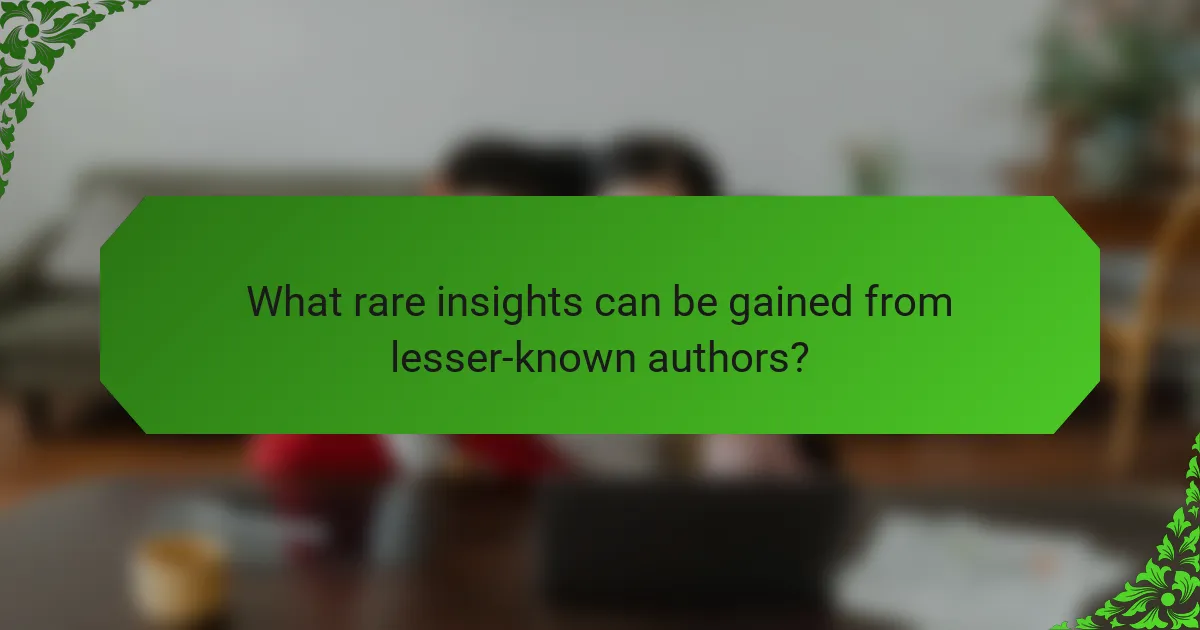
What rare insights can be gained from lesser-known authors?
Lesser-known authors provide unique perspectives that can enhance emotional resilience, mindfulness, and family connections in self-help literature for women. These authors often draw from personal experiences, offering insights that mainstream authors may overlook. Their fresh viewpoints can inspire readers to explore new strategies for personal growth and emotional well-being. Engaging with these voices fosters a deeper understanding of challenges faced by women, making the journey towards resilience more relatable and impactful.
Which emerging voices offer fresh perspectives on mental wellbeing?
Emerging voices in mental wellbeing include authors like Brené Brown, whose work on vulnerability promotes emotional resilience. Other notable figures are Tara Brach, focusing on mindfulness, and Dr. Nicole LePera, advocating for holistic self-healing. Their perspectives emphasize personal growth and community connections, enriching the self-help landscape for women.
What unconventional approaches do these authors take?
Authors of self-help books for women often take unconventional approaches by integrating personal storytelling, combining diverse disciplines, and focusing on community-building. They leverage narrative techniques to create emotional connections, making complex concepts relatable. For instance, some authors draw from psychology, spirituality, and sociology, offering holistic perspectives on emotional resilience and mindfulness. Additionally, they emphasize the importance of family connections, encouraging readers to cultivate supportive networks that enhance personal growth. These innovative strategies not only engage readers but also foster deeper understanding and practical application of the concepts presented.
How do they challenge traditional views on self-help?
Best self-help books for women challenge traditional views by emphasizing emotional resilience, mindfulness, and family connections. They advocate for holistic approaches that prioritize mental well-being over mere success metrics. These books encourage women to embrace vulnerability, fostering deeper self-awareness and personal growth. They often include unique narratives and relatable experiences, making the content more accessible and empowering. As a result, these perspectives reshape conventional self-help paradigms, focusing on nurturing relationships and emotional health as core components of personal development.
What unique cultural influences shape their writing?
Cultural influences such as feminism, personal empowerment, and diverse perspectives shape the writing of self-help books for women. These influences foster emotional resilience, mindfulness, and family connections, addressing unique challenges faced by women today. Authors often draw from their own backgrounds, experiences, and cultural narratives, enriching their messages with authenticity. This cultural context enhances relatability and encourages readers to engage deeply with the material.
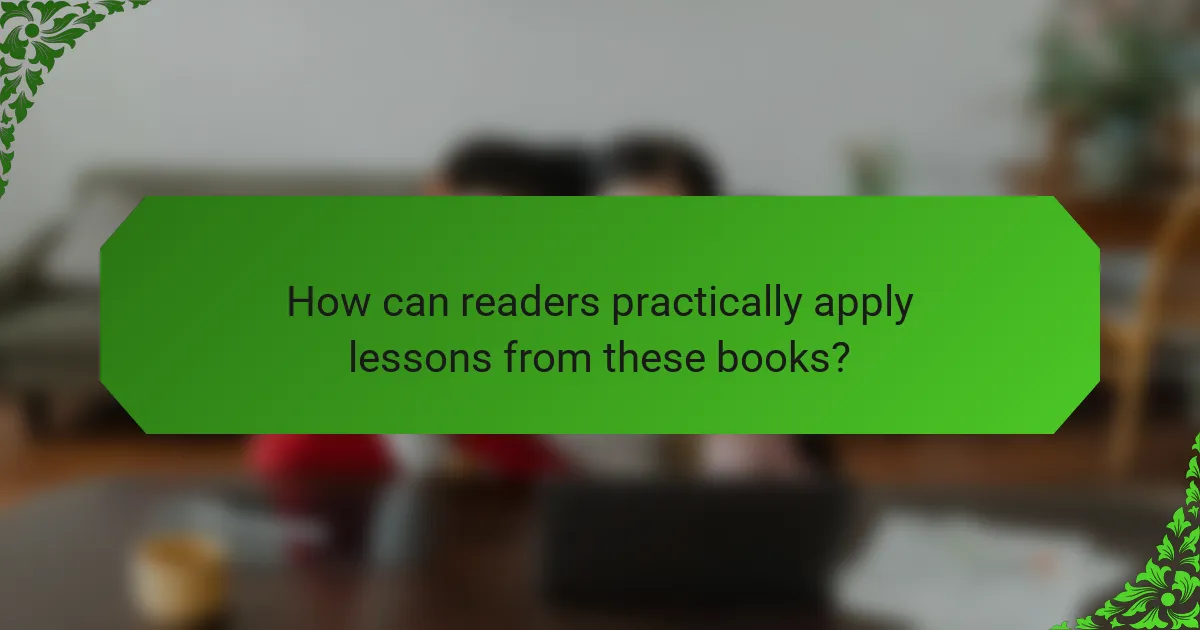
How can readers practically apply lessons from these books?
Readers can apply lessons from self-help books by integrating their insights into daily routines. Start by identifying key concepts that resonate personally, such as emotional resilience or mindfulness. Create actionable steps to incorporate these ideas, like practicing gratitude or setting boundaries in family dynamics. Regular reflection on progress can reinforce these practices, fostering deeper connections and personal growth. Engaging with supportive communities, either online or in-person, can enhance accountability and motivation. By consistently applying these principles, readers can transform their lives and relationships.
What are the best practices for implementing strategies in daily life?
To implement strategies in daily life effectively, focus on consistency, self-reflection, and support systems. Start by setting clear, achievable goals to nurture emotional resilience. Incorporate mindfulness practices, such as meditation or journaling, to enhance self-awareness. Engage with self-help books specifically tailored for women, which can provide insights on family connections and personal growth. Establish a routine that includes these practices to reinforce positive habits and emotional well-being.
What common mistakes should be avoided when using these resources?
Common mistakes to avoid include not setting clear goals, neglecting personal values, and failing to engage with the material. Readers often skip exercises, which diminishes the benefits of self-help books. Additionally, overlooking community support can hinder emotional resilience. Lastly, not applying lessons in daily life limits growth.
How can families create a supportive environment for growth?
Families can create a supportive environment for growth by fostering open communication, encouraging emotional expression, and prioritizing quality time together. Establishing a culture of empathy allows family members to share their feelings and challenges, enhancing emotional resilience. Engaging in mindfulness practices, such as family meditation or shared activities, strengthens connections and promotes mental well-being. Reading self-help books focused on these themes can provide valuable insights and strategies for families to nurture their relationships and support each other’s growth.
What expert insights can enhance the reading experience?
Reading expert insights can significantly enhance the experience of engaging with self-help books for women. These insights often emphasize the importance of emotional resilience, mindfulness, and nurturing family connections, which are core themes in many recommended titles.
For instance, books that focus on emotional resilience provide practical strategies for overcoming adversity, helping readers build a stronger sense of self. Mindfulness practices introduced in these books encourage readers to be present, fostering better mental health and clarity. Additionally, insights into family dynamics can improve relationships, making the reading experience more relevant and impactful.
Incorporating expert opinions and research findings into discussions about these books can deepen understanding and engagement. This approach not only enriches the reading experience but also empowers women to apply the lessons learned to their lives effectively.
